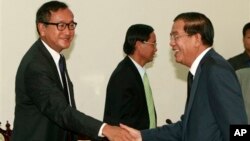Cambodian Prime Minister Hun Sen and the country's main opposition leader held a second day of talks Tuesday in hopes of finding a way to resolve a political crisis that has escalated into violence.
On Monday, Hun Sen and Sam Rainsy, leader of the Cambodian National Rescue Party, agreed to three points: to continue negotiations, to set up a committee for election reform, and to ensure that future protests are peaceful.
On Sunday, protesters marched through Phnom Penh and clashed with police who were armed with tear gas, smoke grenades and water cannons. Human rights activists say one person was fatally shot on an overpass leading to Freedom Park, where 20,000 opposition activists had gathered for a rally addressed by Rainsy.
Sunday's violence marked an escalation of a political crisis that has gripped Cambodia since the election commission certified Hun Sen's Cambodian People's Party as the winner of the July election with 68 seats in the national assembly, ahead of Rainsy's CNRP, which won 55 seats.
The CNRP has rejected those results, alleging widespread fraud.
The certification has left Rainsy with few legal options to challenge the result. Rainsy's party is vowing to boycott the September 23 opening of parliament unless an independent commission is established to investigate the alleged irregularities. The government has rejected the demands.
Cambodian King Norodom Sihamoni brought the two rivals together Saturday for a rare meeting that ended without a breakthrough.
Hun Sen has led Cambodia for 28 years and is seen by critics as an authoritarian ruler despite overseeing a period of prolonged economic growth. Sam Rainsy was not a candidate in the election -- having been in self-imposed exile before returning to Cambodia in July. He returned home after being pardoned by the king for criminal convictions which Rainsy says were politically motivated.
On Monday, Hun Sen and Sam Rainsy, leader of the Cambodian National Rescue Party, agreed to three points: to continue negotiations, to set up a committee for election reform, and to ensure that future protests are peaceful.
On Sunday, protesters marched through Phnom Penh and clashed with police who were armed with tear gas, smoke grenades and water cannons. Human rights activists say one person was fatally shot on an overpass leading to Freedom Park, where 20,000 opposition activists had gathered for a rally addressed by Rainsy.
Sunday's violence marked an escalation of a political crisis that has gripped Cambodia since the election commission certified Hun Sen's Cambodian People's Party as the winner of the July election with 68 seats in the national assembly, ahead of Rainsy's CNRP, which won 55 seats.
The CNRP has rejected those results, alleging widespread fraud.
The certification has left Rainsy with few legal options to challenge the result. Rainsy's party is vowing to boycott the September 23 opening of parliament unless an independent commission is established to investigate the alleged irregularities. The government has rejected the demands.
Cambodian King Norodom Sihamoni brought the two rivals together Saturday for a rare meeting that ended without a breakthrough.
Hun Sen has led Cambodia for 28 years and is seen by critics as an authoritarian ruler despite overseeing a period of prolonged economic growth. Sam Rainsy was not a candidate in the election -- having been in self-imposed exile before returning to Cambodia in July. He returned home after being pardoned by the king for criminal convictions which Rainsy says were politically motivated.





